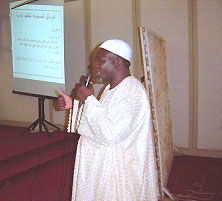You are here » Home » Telling Our Story
Success Story
Advocacy training inspires support for HIV/AIDS prevention
Imams Promote HIV/AIDS Prevention

| |
Photo: POLICY Project/Modibo Maiga
|
|
During an advocacy training for religious leaders in March 2005, El Hadj Mamadou Traore, a member of Mali’s Islamic High Council, gave a presentation in support of birth spacing.
In collaboration with the President’s Emergency Plan for AIDS Relief, USAID is working to empower religious leaders and decision-makers to advocate on behalf of family planning and HIV/AIDS prevention.
|
Known in the press as the “Red Imam” for his passionate and candid responses to health issues in Mali, Imam Cherif Haidara has become a champion of fighting HIV/AIDS through Islam. He became famous in 2002 for an exchange during an advocacy presentation on HIV/AIDS prevention for the President of Mali and 200 imams and religious scholars. During this presentation, a speaker refused to read the word “condom” when it appeared in his slides. Imam Haidara asked the speaker why he refused to read the word. He then asked anyone in the room to produce evidence from the Koran that prohibits condom use. There was no response. He concluded by proclaiming that supporting condom use protects Malians from the catastrophe of HIV/AIDS — it was the first public demonstration of support from a religious leader for using condoms to prevent HIV/AIDS.
Mali has a relatively low HIV/AIDS rate of 1.7 percent, but it is much greater among high risk populations, which could accelerate the spread of the virus if unchecked. In addition, Mali’s high maternal mortality rate could decrease if more women used contraceptives. Religious leaders in Mali influence people’s decisions about contraceptive use. Many imams believe that Islam forbids contraception, posing obstacles to preventing HIV/AIDS infection.
USAID is working to help religious leaders advocate for improved family planning and HIV/AIDS prevention efforts. One initiative uses verses from the Koran and other religious texts that support the idea of family planning as a way to promote quality of life over quantity of children. USAID’s project works with the Ministry of Health, Mali’s High Islamic Council, and a research team to develop teaching tools and platforms for discussions with religious leaders and decision makers. USAID also sponsors training aimed at building capacity, leadership, and advocacy skills among imams. Another model targets Mali’s Christian population.
Religious leaders such as Imam Haidara are well known and admired by a large Muslim following. With support from USAID, Imam Haidara and others are developing skills and tools to inspire public support for HIV/AIDS prevention and family planning from the country’s Muslim population.
Print-friendly version of this page (326kb - PDF)
Click here for high-res photo
Back to Top ^ | 

